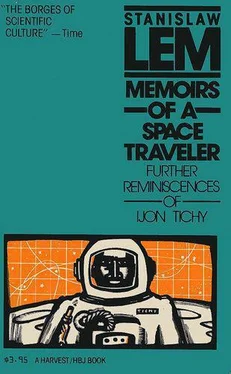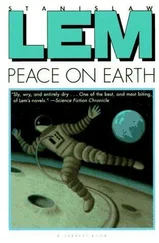And now, gentlemen, the most terrible thing. The machine has come to a halt there in the future; but this building, this apartment, this room, and this empty corner are traveling through time, too — though in the only manner accessible to us — and will travel and eventually arrive at the moment when the machine came to rest. And then the machine will appear there in the white corner, and, with it, Molteris… what is left of him… and this is inevitable.
V
(The Washing Machine Tragedy)
Shortly after my return from the Eleventh Voyage, the papers began to devote increasing space to the competition between two large washing-machine manufacturers, Newton and Snodgrass.
It was probably Newton who first marketed washers so automated that they themselves separated the white laundry from the colored, and after scrubbing and wringing out the clothes, pressed, darned, hemmed, and adorned them with beautifully embroidered monograms of the owner, and sewed onto towels uplifting, stirring maxims such as “The early robot catches the oilcan.” Snodgrass’s response to this was a washer that composed quatrains for the embroidering, commensurate with the customer’s cultural level and aesthetic requirements. Newton’s next model embroidered sonnets; Snodgrass reacted with a model that kept family conversation alive during television intermissions. Newton attempted to nip this escalation in the bud; no doubt everyone remembers his full-page ads containing a picture of a sneering, bug-eyed washer and the words: “Do you want your washing machine to be smarter than you? Of course not!” Snodgrass, however, completely ignored this appeal to the baser instincts of the public, and in the next quarter introduced a machine that washed, wrung, soaped, rinsed, pressed, starched, darned, knitted, and conversed, and — in addition — did the children’s homework, made economic projections for the head of the family, and gave Freudian interpretations of dreams, eliminating, while you waited, complexes both Oedipal and gerontophagical. Then Newton, in despair, came out with the Superbard, a versifier-washer endowed with a fine alto voice; it recited, sang lullabies, put babies on the potty, charmed away warts, and paid ladies exquisite compliments. Snodgrass parried with an instructor-washer under the slogan: “Your washing machine will make an Einstein out of you!” Contrary to expectations, however, this model did poorly; business had fallen off 35 percent by the end of the quarter when a financial review reported that Newton was preparing a dancing washer. Snodgrass decided, in the face of imminent ruin, to take a revolutionary step. Buying up the appropriate rights and licenses from interested parties for a sum of one million dollars, he constructed, for bachelors, a washing machine endowed with the proportions of the renowned sexpot Mayne Jansfield, in platinum, and another, the Curlie McShane model, in black. Sales immediately jumped 87 percent. His opponent appealed to Congress, to public opinion, to the DAR, and to the PTA. But when Snodgrass kept supplying stores with washers of both sexes, more and more beautiful and seductive, Newton gave in and introduced the custom-built washers, which received the figure, coloring, size, and likeness chosen by the customer according to the photograph enclosed with his order. While the two giants of the washing-machine industry thus engaged in all-out war, their products began to exhibit unexpected and dangerous tendencies. The wet-nurse washers were bad enough, but washers that led to the ruin of promising young men and women, that tempted, seduced, and taught bad language to children — they were a serious family problem, not to mention washers with which one could cheat on one’s husband or wife! Those manufacturers of washing machines who still remained in business told the public, in ads, that the Jansfield-McShane washer represented an abuse of the high ideals of automated laundering (which was intended, after all, to strengthen and support the domestic way of life), since this washer could hold no more than a dozen handkerchiefs or one pillowcase, the rest of its interior being occupied by machinery that had not a thing to do with laundering — quite the contrary. These appeals had no effect. The snowballing cult of beautiful washers even tore a considerable part of the public away from their television sets. And that was only the beginning. Washers endowed with full spontaneity of action formed clandestine groups and engaged in shady operations. Whole gangs of them entered into cahoots with criminal elements, became involved with the underworld, and gave their owners terrible problems.
Congress saw that it was time to intervene with legislative action in this chaos of free enterprise, but before its deliberations had produced a remedy, the market was glutted with wringers that had curves no one could resist, with genius floor polishers, and with a special armored model of washing machine, the Shotamatic; allegedly designed for children playing cowboys and Indians, this washer, after a simple modification, could destroy any target with rapid fire. During a rumble between the Struzelli gang and the terror of Manhattan, the Byron Phums — this was when the Empire State Building was blown up — among the casualties on both sides were more than one hundred and twenty cooking appliances armed to the lid.
Then Senator MacFlacon’s Act went into effect. According to this law, an owner was not held responsible for the actions of his intelligent devices to the extent that such occurred without his knowledge or consent. Unfortunately, the law opened the way for numerous abuses. Owners entered into secret pacts with their washers or wringers, so that, when the machine committed a crime, the owner, hauled into court, got off by invoking the MacFlacon Act.
It became necessary to amend this law. The new MacFlacon-Glumbkin Act granted intelligent devices a limited legal status, chiefly as regarded culpability. It stipulated punishments in the form of five, ten, twenty-five, and fifty years of forced washing, or of floor polishing augmented by deprivation of oil, and there were physical punishments up to and including short-circuiting. But the implementation of this law also encountered obstacles. For example, the Humperlson case: the washer, when charged with the perpetration of numerous holdups, was taken apart by its owner, and the pile of wires and pipes was placed before the court. An amendment was then added to the law — known henceforth, as the MacFlacon-Glumbkin-Ramphorney Act — establishing that the making of any alteration in an electrobrain under investigation constituted a punishable offense.
Then the Ciaccopocorelli case. Ciaccopocorelli’s sink frequently dressed in its owner’s suits, proposed marriage to various women, and swindled them out of their money. When caught in flagrante by the police, the sink dismantled itself before the eyes of the astounded detectives, whereupon it lost all memory of the crime and therefore could not be punished. There followed the MacFlacon-Glumbkin-Ramphorney-Hemmling-Piaffki Act, according to which a brain that dismantled itself in order to avoid trial would be summarily scrapped.
This law, it seemed, would serve to deter any electrobrain from criminal activity, since such a machine, like any sentient being, possessed the instinct of self-preservation. It turned out, however, that accomplices of the criminal washers were buying their scrapped remains and rebuilding them. A proposal to add an antiresurrection clause to the MacFlacon Act, though approved by a congressional committee, was torpedoed by Senator Davis; shortly thereafter it was discovered that Senator Davis was a washer. It has been the custom, since then, to tap congressmen before each session; a two-and-a-half-pound mallet is traditionally used for this purpose.
Читать дальше












